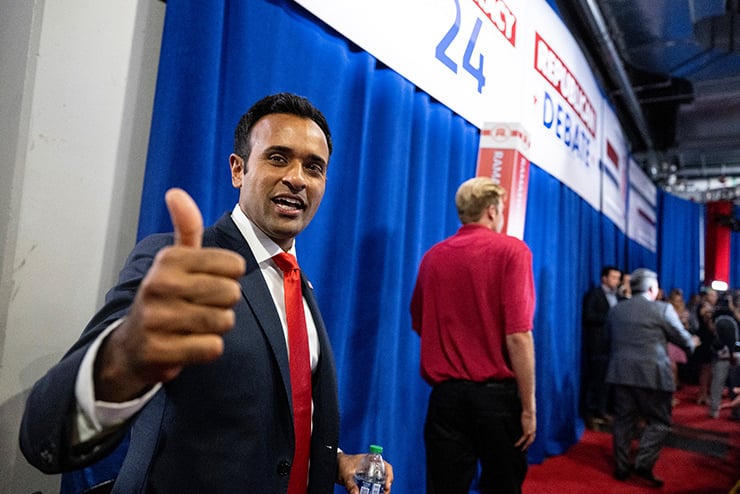In 2016, Donald Trump faced the strongest Republican presidential field in decades.
Ted Cruz and Marco Rubio were brash young champions of the Tea Party that had redefined the GOP in the last two midterms. Scott Walker was the paladin of the Reaganite right and the governor of a key Midwest battleground. The Bush wing of the party had a contender in the form of former Florida Gov. Jeb Bush, while the “libertarian moment” whose arrival The New York Times had heralded in 2014 found its hero in Rand Paul.
Trump had none of the conservative credentials of these and other rivals; he didn’t need them. But after the first Republican presidential debate of this election season, Trump faces a new opponent that may prove tougher: Trumpism.
Trump wasn’t on stage in Milwaukee, but Trumpism was, thanks to 38-year-old businessman Vivek Ramaswamy. The entrepreneur was easily Trump’s most enthusiastic defender at the debate. Ramaswamy held his hand high when candidates were asked to show whether they’d still support Trump if he won the nomination but was convicted of a crime in one of the many cases against him.
When other candidates agreed that Vice President Mike Pence had done the right thing on Jan. 6, 2021, by resisting Trump’s pressure to call Electoral College results into question, Ramaswamy dissented. He spoke Trump’s language and was forceful on Trump’s issues, including a less hawkish foreign policy, which got him into an incendiary exchange with Nikki Haley over support for Ukraine.
Ramaswamy has cultivated Trump’s knack for the stinging barb. “Nikki, I wish you well on your future career on the boards of Lockheed and Raytheon,” he shot at her. Others made no effort to disguise their exasperation: “I’ve had enough already tonight of a guy who sounds like ChatGPT,” said Christie.
That’s how Ramaswamy’s detractors see him—as TrumpGPT, a large language module lab-built to mimic the former president when Trump isn’t in the room.
Along with that criticism comes a claim that Ramaswamy’s purpose is to take votes away from the other candidates, helping Trump secure the nomination. If Ramaswamy is a Trump clone, however, isn’t he more likely to take votes from Trump himself?
Some polls had Ramaswamy rising even before the debate, though others cast doubt on his surge. Numbers after the Milwaukee forum were similarly mixed—in some surveys, Ramaswamy had soared to third place, a few points behind Ron DeSantis. In others, he had actually lost support or was stalled around 5%.
Trump’s numbers dipped a little in multiple polls, and among Republican-leaning voters who watched the debate, there was a shift in the direction of considering (if not committing to) other candidates, including Ramaswamy.
These data are too rough for any firm conclusions, but they’re suggestive enough that Trump may not want to sit out future debates.
If the ex-president participates, his presence will vastly increase viewership—which means more people will see and hear his rivals. Without him, the field has a smaller audience, but his rivals have it all to themselves, and they get the following days’ headlines, too.
The conflicts that Trump causes fascinate the American public—and, if they’re honest, the media, too. Yet the debates can be great gladiatorial matches on their own, and by channeling Trump, Ramaswamy made last week’s event just such a spectacle. The jeering, cheering, and heckling from the crowd certainly sounded like something from the days of Caligula, or at least like pro-wrestling fans at a poor man’s WrestleMania.
As Trump showed in 2016, none of the GOP’s ideological factions has the clout to compete with his personality. But a younger, equally provocative outsider who says exactly the things Trump would say, from issues to insults, is something the impresario of “The Apprentice” hasn’t encountered before.
Although he didn’t steal any headlines with his Milwaukee performance, Ron DeSantis has been conducting a steady ground campaign in the early primary states. Come January, if Ramaswamy has gained support at Trump’s expense, DeSantis could be in position to narrow the gap with Trump, if not win outright.
Trump’s critics have long argued his success in 2016 was down to the size and fragmentation of the field. This cycle, it’s just possible there will be fragmentation on the Trump side, between him and Ramaswamy, giving DeSantis an opening to consolidate the get-beyond-Trump vote.
Unfortunately for DeSantis, the third primary of 2024, South Carolina, is likely to be very good to a favorite son and favorite daughter of the state—Tim Scott and Nikki Haley.
The race is still Trump’s to lose. Ramaswamy may pose a new challenge, but the opponent Trump has to take most seriously right now isn’t him or DeSantis or Joe Biden; it’s Democratic state and federal prosecutors.
To read more by Daniel McCarthy, visit www.creators.com COPYRIGHT 2023 CREATORS.COM

Leave a Reply